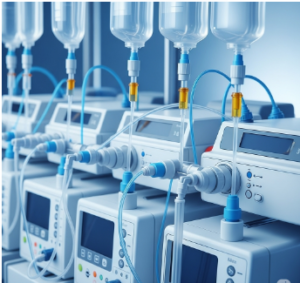The global connected drug delivery devices market was valued at USD 361.1 million in 2018 and is anticipated to reach approximately USD 25,810.9 million by 2032, growing at a robust CAGR of 35.7% during the forecast period from 2018 to 2032. In 2018, North America led the market, accounting for a dominant share of 70.06%.
The global connected drug delivery devices market has experienced significant growth in recent years and is expected to expand rapidly over the forecast period. This growth is driven by increasing demand for smart healthcare solutions that enhance patient adherence, enable real-time monitoring, and improve treatment outcomes. The integration of digital technologies such as IoT, mobile health applications, and cloud-based platforms is transforming drug delivery practices. Regions like North America have been at the forefront of adoption due to advanced healthcare infrastructure and favorable regulatory frameworks. As awareness and access to connected therapeutics continue to rise globally, the market is poised for substantial expansion in the coming years.
Continue reading for more details:
Market Segmentation
By Product Type
- Smart inhalers
- Connected insulin pens
- Wearable injectors
- Connected autoinjectors
- Infusion pumps
By Connectivity
- Bluetooth-enabled devices
- Wi-Fi-connected systems
- Cellular-connected platforms
By Therapeutic Application
- Diabetes management
- Asthma and COPD
- Oncology
- Hormonal disorders
- Autoimmune conditions
By End User
- Hospitals and clinics
- Home care settings
- Ambulatory care centers
- Specialty treatment centers
By Distribution Channel
- Hospital pharmacies
- Retail pharmacies
- Online platforms
- Direct-to-patient sales
List Of Key Companies Profiled:
- Proteus Digital Health
- Ypsomed Holding
- Hoffmann-La Roche Ltd
- BD
- West Pharmaceutical Services
- Propeller Health (A ResMed Company)
- Adherium
- Cohero Health, Inc.

Market Growth
- The Connected Drug Delivery Devices market is witnessing steady growth owing to the rising demand for personalized and remote healthcare solutions.
- Increasing patient adherence monitoring and treatment optimization are driving growth within the Connected Drug Delivery Devices market.
- Expansion in chronic disease management and home-based therapy options is further boosting the Connected Drug Delivery Devices market.
- Integration of AI, cloud platforms, and IoT technologies is transforming the dynamics of the Connected Drug Delivery Devices market.
- Pharmaceutical companies are increasingly investing in connected platforms to enhance user engagement within the Connected Drug Delivery Devices market.
Restraining Factors
- High setup and maintenance costs limit entry into the Connected Drug Delivery Devices market for smaller healthcare providers.
- Concerns over data privacy and cybersecurity impact trust and adoption rates in the Connected Drug Delivery Devices market.
- Lack of universal regulatory standards poses challenges for global expansion of the Connected Drug Delivery Devices market.
- Limited interoperability with existing electronic health record (EHR) systems slows integration in the Connected Drug Delivery Devices market.
- Patient resistance to digital monitoring and device complexity can hinder growth in the Connected Drug Delivery Devices market.
Regional Analysis
North America
- Dominates the Connected Drug Delivery Devices market due to strong digital health infrastructure and regulatory backing.
- High adoption rates of mobile health applications and connected therapeutics.
Europe
- Growing implementation of eHealth and mHealth solutions fosters growth in the Connected Drug Delivery Devices market.
- Government incentives and innovation hubs support product development.
Asia Pacific
- Rapid urbanization and growing middle-class population are propelling the Connected Drug Delivery Devices market.
- Surge in chronic disease prevalence and smartphone penetration is accelerating adoption.
Latin America
- Moderate growth in the Connected Drug Delivery Devices market driven by emerging digital health policies.
- Public-private collaboration is aiding access to connected health devices.
Middle East & Africa
- Nascent but expanding Connected Drug Delivery Devices market supported by telemedicine pilots and healthcare digitization.
- Growing investment in hospital automation and smart drug delivery systems.